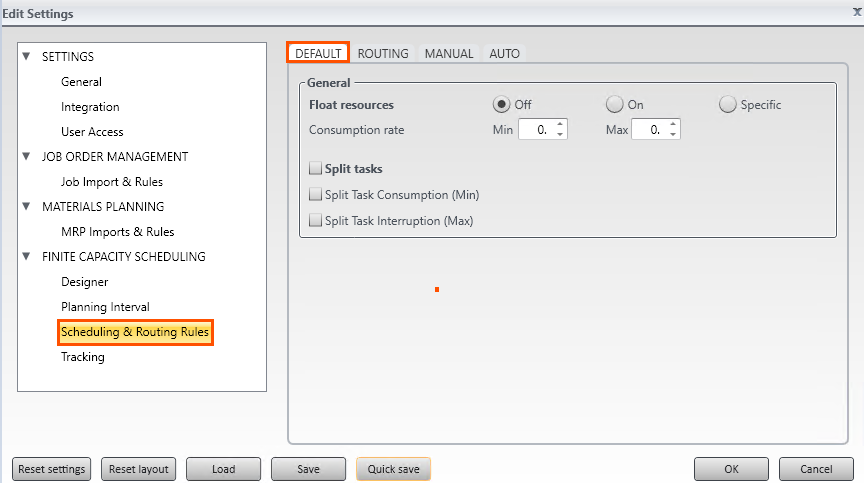|
Float Resources
Using float will decrease or increase the elapsed time of the operation.
|
Refer to the table below for an explanation of all settings on the Scheduling & Routing Rules > Default Tab

Scheduling & Routing Rules Default Settings
|
Setting
|
Explanation
|
|
Float Resources
|
By default, LYNQ consumes the number of resources defined in the operation parameters. By using float, LYNQ can consume variable quantity of resources.
- Off = Resources defined in the operation will be consumed
- On = Resources are consumed based on the number of resources defined against the work unit. Resources will only be consumed up to the Float Consumption Max value
- Specific = The Max Consumption rates values will apply to all work units
The default settings can be amended from the Schedule Tab, prior to scheduling.
|
|
Consumption Rate
Min/Max
|
Used by Float Specific
|
|
Split Tasks
|
This setting allows Visual APS to utilise any free space in the schedule even if it means that the operation/job will be started and stopped before completion. For example, imagine that a shift is from 8:00 to 12:00 and an operation is scheduled from 9:00 to 11:00. If a 2 hour operation is scheduled with split tasks enabled, the operation will be split to start from 8:00 to 9:00 for 1 hour and then from 11:00 to 12:00 for 1 hour, when dragged to start at 8:00 on the schedule board.
|
|
Split Task Consumption (Min)
|
The minimum amount of time an operation can be split for. The Split Task Consumption (Min) value specified in (HH:MM) is configured against the work unit. If less time is available, the task cannot be scheduled during that time slot. This is used to prevent situations where operations are scheduled for a short period of time before it needs to be stopped for another operation to start.
|
|
Split Task Interruption (Max)
|
The maximum amount of time an operation can be interrupted for. The Split Task Interruption (Max) value specified in (HH:MM) is configured against the work unit.. If more time than this amount is required to interrupt the task (for other tasks), the task cannot be scheduled during that time slot.
|
.
.
|

